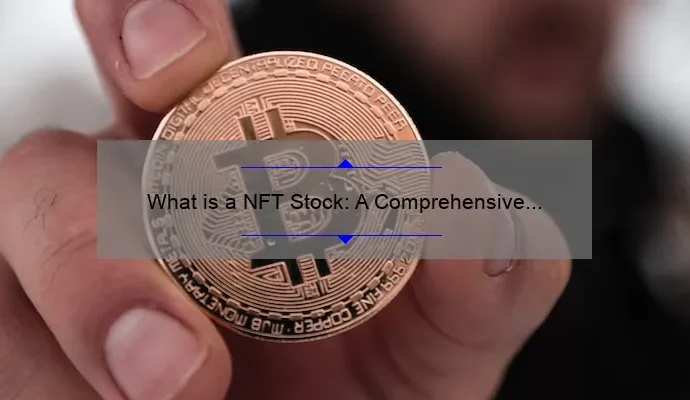Resposta curta: O que é uma ação NFT Uma ação NFT (Non-Fungible Token) não existe atualmente. As NFTs são tokens digitais únicos que representam ativos ou colecionáveis, como arte digital, vídeos e música. No entanto, o termo “NFT stock” pode se referir à negociação de ações de empresas envolvidas na tecnologia das criptomoedas ou em
Resposta curta: O que é uma ação NFT
Uma ação NFT (Non-Fungible Token) não existe atualmente. As NFTs são tokens digitais únicos que representam ativos ou colecionáveis, como arte digital, vídeos e música. No entanto, o termo “NFT stock” pode se referir à negociação de ações de empresas envolvidas na tecnologia das criptomoedas ou em plataformas relacionadas às NFTs. É importante ter clareza sobre qual significado específico está sendo abordado para fornecer informações precisas.
Introduction: Understanding the Basics of NFT Stocks
Introduction: Understanding the Basics of NFT Stocks
In recent years, non-fungible tokens (NFTs) have taken the world by storm, revolutionizing various industries and challenging traditional notions of ownership. While most people are familiar with NFTs in relation to digital art or collectibles, a new concept is emerging – NFT stocks. In this blog post, we will explore the fundamentals of NFT stocks, diving into their definition, functionality, and potential implications for investors.
What are NFT Stocks?
Before delving deeper into the concept of NFT stocks, let’s clarify what an NFT actually is. A non-fungible token represents a unique item or asset on a blockchain network such as Ethereum. Unlike cryptocurrencies like Bitcoin or Ethereum that are interchangeable with one another, each NFT possesses distinct properties and cannot be replicated. This uniqueness grants them value and has popularized their use in the art world.
NFT stocks take this idea a step further by combining the technology behind NFTs with traditional stock market offerings. These tokens represent ownership in companies or projects related to the burgeoning field of non-fungible tokens. Similar to investing in traditional stocks, purchasing NFT stocks allows individuals to own fractional shares in these entities and potentially benefit from their growth.
How do NFT Stocks Function?
To understand how NFT stocks function, we must first grasp some key concepts of blockchain technology and decentralized finance (DeFi). Unique identifiers on a blockchain ensure that each token corresponds to a specific asset or company share.
Investing in an NFT stock involves acquiring these tokens through platforms or exchanges that facilitate trading in DeFi ecosystems. Once obtained, these digital representations of ownership can be stored safely within decentralized wallets by investors until they decide to sell or trade them.
The value of an NFT stock depends on various factors such as demand for associated services or products and overall market sentiment towards non-fungible tokens. As the world of NFTs continues to grow and evolve, the value proposition offered by these stocks should be carefully considered by investors looking to diversify their portfolios.
Implications for Investors
Participating in the NFT stock market offers a unique opportunity for investors seeking exposure to the promising realm of non-fungible tokens. By investing in companies that are leading innovators or driving adoption within this space, individuals can potentially tap into a rapidly expanding market and benefit from its growth.
However, it is important to approach NFT stocks with caution and conduct thorough due diligence when selecting investments. As with any investment, there are risks involved, including regulatory uncertainties and market volatility. Staying informed about industry trends and closely monitoring the progress of specific projects or companies can help mitigate some of these risks.
NFT stocks represent an exciting intersection between traditional finance and groundbreaking blockchain technology. By blending ownership rights with the unique qualities of non-fungible tokens, these stocks provide investors with an avenue to participate in the ever-evolving world of NFTs. While they offer numerous potential benefits, it is crucial for investors to exercise caution and stay well-informed before diving into this emerging sector. With proper research and understanding, NFT stocks hold great promise as a way to capitalize on the growing influence of non-fungible tokens in various industries.
Unlocking the Mystery: How Does an NFT Stock Work?
Unlocking the Mystery: How Does an NFT Stock Work?
The world of cryptocurrency and digital assets has witnessed a recent surge in popularity, with the advent of Non-Fungible Tokens (NFTs) taking center stage. NFTs have become the latest hot topic in the investment space, capturing the attention of both seasoned investors and curious newcomers alike. One particularly intriguing aspect is the concept of an “NFT stock.” But what exactly is it, and how does it work? In this blog post, we aim to unravel the mysteries surrounding NFT stocks and shed light on their inner workings.
To understand NFT stocks, one must first grasp the fundamental concept of an NFT itself. Unlike cryptocurrencies such as Bitcoin or Ethereum, which are fungible because each unit is interchangeable with another identical unit, NFTs are completely unique and cannot be exchanged for one another on a like-for-like basis. It is this scarcity that gives them value. The most common use case for NFTs is art and collectibles; however, they can also represent ownership rights to various types of digital or physical assets.
So where do NFT stocks fit into this equation? An NFT stock refers to fractionalized ownership of an NFT asset, allowing investors to gain exposure to valuable digital objects without having to purchase them outright. Think of it as buying shares in a company. Instead of owning complete ownership rights over an artwork or collectible, investors can purchase fractions that represent a percentage stake in that specific asset’s value.
But how does one acquire these NTF stocks? Typically, specialized platforms called fractionalize marketplaces facilitate their creation and trading. These platforms allow creators to tokenize their assets by dividing them into smaller portions that can then be sold as shares. Investors looking to invest in these assets can browse through various offerings on these marketplaces and decide which ones align with their investment goals.
One might wonder why investors would choose NFT stocks over traditional ownership. There are several reasons for this. Firstly, by fractionalizing an asset, owners can unlock liquidity and realize immediate value, enabling more flexibility in their investment strategies. Additionally, NFT stocks offer exposure to high-value assets that might otherwise be inaccessible due to exorbitant prices. It democratizes the art market and allows investors with smaller budgets to participate in the digital asset space.
Moreover, NFT stocks provide a unique opportunity for diversification within the NFT ecosystem itself. Instead of putting all their eggs in one basket and investing heavily in a single NFT, investors can spread their risk by purchasing fractions of multiple assets. This not only reduces overall portfolio volatility but also allows them to explore different niches within the vibrant world of NFTs.
As with any investment, it’s important to highlight potential risks associated with NFT stocks. Since this is still a nascent market, regulations are relatively unestablished compared to traditional financial markets. Investors need to conduct thorough due diligence on both the marketplace and underlying assets before making any commitments. Additionally, as with any speculative investment, the value of an NFT stock can fluctuate dramatically based on various factors such as demand trends and speculation levels.
In conclusion, NFT stocks offer an innovative doorway into the world of non-fungible tokens for investors looking to ride the wave of digital art and collectibles without breaking the bank or committing fully to a single asset. By providing fractionalized ownership options and fostering greater accessibility and liquidity within the market, these unique financial instruments enable wider participation in this growing sector. However, careful research and consideration should always accompany any investment decision made within this rapidly evolving ecosystem.
A Step-by-Step Guide to Investing in NFT Stocks
Title: Unveiling the Secrets of NFT Stock Investing: A Comprehensive Step-by-Step Guide
Introduction:
In recent times, the rise of Non-Fungible Tokens (NFTs) has sparked tremendous curiosity, with investors eager to explore this burgeoning market. NFT stocks have emerged as a promising investment avenue, providing an opportunity to capitalize on the digital asset revolution. This step-by-step guide sheds light on the intricacies of investing in NFT stocks, elucidating essential concepts and strategies that can propel you towards financial success.
Step 1: Understanding NFT Stocks
Firstly, let’s unravel the concept of NFTs. Unlike conventional cryptocurrencies such as Bitcoin or Ethereum, which are interchangeable and possess equal value, non-fungible tokens are unique digital assets representing ownership or proof of authenticity for a particular item. By comprehending these fundamental distinctions, you lay a solid foundation for delving deeper into the world of NFT stock investments.
Step 2: Researching Prominent NFT Stocks
Conduct thorough research to identify prominent companies operating within the NFT realm. This entails studying their business models, revenue streams, and most importantly, their connection to the booming industry. Assess their partnerships with artists, influencers, and blockchain platforms—crucial indicators of long-term growth potential.
Step 3: Evaluating Market Sentiment
One key aspect of successful investment is gauging market sentiment accurately. Keep an eye on mainstream media coverage related to NFTs and analyze public perception regarding specific projects or collaborations within the space. This will help you anticipate market trends and fine-tune your investment decisions accordingly.
Step 4: Diversifying Your Portfolio
Diversification is a golden rule in any investment strategy. Instead of solely focusing on one company’s NFT stock offerings, consider diversifying your portfolio across multiple promising industry players. By spreading your risk among various projects with differing core competencies, you can potentially maximize your returns and protect against unforeseen volatility.
Step 5: Technical Analysis and Trading Patterns
Delve into technical analysis and trading patterns to gain insights into the historical performance of NFT stocks. Evaluate charts, identify crucial support and resistance levels, and study relevant indicators such as relative strength index (RSI) or moving averages. This diligent analysis will empower you to identify optimal entry and exit points effectively.
Step 6: Maintain a Long-Term Perspective
NFT stocks constitute a nascent market segment that’s evolving at an exhilarating pace. While day trading can be enticing, it’s essential to cultivate a long-term investment mindset. Recognize the potential for exponential growth in this industry over the coming years, allowing your investments to mature gradually while embracing the inherent volatility along the way.
Step 7: Stay Abreast of Industry Developments
The NFT arena is ever-evolving; hence keeping abreast of industry developments is imperative. Follow influential figures within the space—artists, entrepreneurs, investors—and monitor relevant news outlets for updates on game-changing innovations or regulatory changes. Staying informed ensures that you adapt your investment strategy according to emerging trends.
Conclusion:
Navigating the world of NFT stock investing requires expertise and analytical acumen. By following this comprehensive step-by-step guide, armed with a thorough understanding of NFTs, conducting meticulous research, diversifying portfolios wisely, employing technical analysis tools, maintaining a long-term perspective, and staying updated on industry developments—you are poised to venture confidently into this exciting domain.
Disclaimer: The information provided in this guide should not be considered financial advice. Always consult with licensed professionals before making any investment decisions.
Frequently Asked Questions about NFT Stocks: Answers You Need to Know
Title: Demystifying NFT Stocks: Your Ultimate Guide to Frequently Asked Questions
Introduction:
In the fast-evolving world of NFT (Non-Fungible Tokens) stocks, a multitude of questions arise. As individuals thirst for knowledge about this groundbreaking investment opportunity, we’ve compiled a list of frequently asked questions and expertly crafted answers to help you navigate the intricate realm of NFT stocks. Brace yourself for an enlightening journey as we uncover the mysteries and reveal all you need to know about this exciting market.
1. What exactly are NFT stocks?
NFT stocks represent shares or partial ownership in companies specializing in the creation, trading, or supporting infrastructure related to non-fungible tokens. These publicly traded stocks grant investors exposure to the booming NFT market without directly owning specific digital assets.
2. Why invest in NFT stocks rather than purchasing individual NFTs?
Investing in NFT stocks offers several advantages over solely focusing on buying individual tokens. Firstly, it provides diversification by spreading risk across multiple projects within the industry. Additionally, investing in established companies affords access to experienced management teams and potentially steady revenue streams generated from various aspects of the NFT market, such as marketplace fees or licensing deals.
3. Which sectors can I find NFT stock opportunities in?
The potential investment opportunities within the world of NFT stocks span a range of sectors including but not limited to: platform providers enabling tokenized collectibles creation; blockchain infrastructure developers; art galleries embracing digital artworks; online marketplaces facilitating token trading; software developers creating unique user experiences for collectors; and even traditional companies expanding into the crypto space through partnerships or acquisitions.
4. How do I evaluate an attractive NFT stock?
When assessing an enticing NFT stock prospect, it’s essential to consider factors such as the company’s financial stability, growth potential within its niche market segment, strategic partnerships with prominent artists or brands, technological advancements fuelling innovation, and future scalability of the platform or service being offered.
5. Are NFT stocks subject to significant risks?
As with any investment, NFT stocks carry inherent risks. Investors should be aware of factors such as regulatory uncertainties surrounding crypto assets, price volatility within the overall cryptocurrency market, technological limitations that may affect usability and adoption, as well as potential challenges related to intellectual property rights and copyright issues in the digital realm.
6. What role does blockchain technology play in NFT stocks?
Blockchain technology underpins the functionality and value proposition of NFT stocks. Distributed ledger technologies ensure transparency, immutability, secure ownership verification, and efficient transaction processing for both physical and digital assets tokenization. The use of blockchain also mitigates counterfeiting risks while enabling frictionless peer-to-peer transactions.
7. Can I trade NFT stocks on regular stock exchanges?
Yes! Many publicly traded companies involved in the NFT space are listed on traditional stock exchanges where you can buy and sell their shares just like any other stock. This accessibility allows a wider range of investors to participate in this rapidly expanding market without requiring specialized knowledge or entry barriers associated with solely trading individual non-fungible tokens.
Conclusion:
As interest in NFTs continues to soar, exploring the world of NFT stocks presents an exciting alternative investment avenue steeped with evolving opportunities. By understanding these frequently asked questions and their comprehensive answers, you can now embark on your journey into this groundbreaking market with confidence. Remember to conduct further research, stay updated with the latest industry trends, consult professionals when needed, and exercise caution while navigating through this captivating landscape. Happy investing!
Exploring the Potential: Benefits and Risks of Investing in NFT Stocks
Title: Exploring the Potential of NFT Stocks: Unveiling the Benefits and Risks
Introduction:
The rise of non-fungible tokens (NFTs) has brought about a significant revolution in the digital art world. These unique digital assets have captured the attention of investors, enthusiasts, and artists alike due to their potential for groundbreaking innovation. In this blog post, we will delve deep into the fascinating realm of NFT stocks and explore both their tantalizing benefits and potential risks.
1. Understanding NFT Stocks:
Before diving into the benefits and risks, let’s have a brief overview of what NFT stocks entail. Unlike traditional stocks that represent ownership in a company or its underlying assets, NFT stocks offer fractional ownership of specific NFTs or portfolios. This novel investment avenue combines the exciting world of NFTs with the stability and familiarity of stock markets.
2. The Potential Benefits:
a) Unique Investment Opportunities:
NFT stocks unlock doors to an entirely new class of assets within the digital realm. By investing in these virtual treasures, individuals can diversify their portfolios beyond traditional investments such as stocks or bonds. With unique artwork, collectibles, and even virtual real estate becoming increasingly popular as NFTs, investors may identify lucrative opportunities within rapidly expanding online markets.
b) Liquidity Potential:
One attractive feature of NFT stocks is their potential liquidity compared to owning physical artworks or collectibles directly. Investors can buy or sell fractional shares in an artwork without hassle since trading platforms are open 24/7 globally. This accessibility enables investors to quickly react to market trends or take advantage of emerging opportunities without relying on auctions or galleries.
c) Exposure to Growing Industry:
Investing in NFT stocks provides exposure to a burgeoning industry that is continuously pushing boundaries and reshaping art markets fundamentally. By supporting NFT creators and platforms through investments, investors facilitate innovations within blockchain technology while potentially benefiting from its growth.
3. The Potential Risks:
a) Volatility and Speculative Nature:
As with any emerging market, NFT stocks carry inherent risks tied to their relatively young age and volatility. Fluctuations in the value of NFTs can be drastic, making it crucial for investors to carefully assess the underlying factors influencing prices. Due diligence is necessary to determine if the current hype surrounding specific NFTs is sustainable or merely a short-term trend.
b) Regulatory Uncertainties:
The regulatory landscape surrounding NFTs is still evolving, and uncertainties persist in various jurisdictions. Any significant changes in regulations may impact the viability and potential profitability of investing in NFT stocks. Investors must closely monitor regulatory developments to ensure compliance and mitigate potential legal risks.
c) Market Saturation and Fragmentation:
With an increasing influx of new creators and platforms entering the NFT market, saturation becomes a concern for investors. As demand spreads across a vast array of options, fragmentation can occur, potentially diluting the value of certain NFT stocks. It is essential to carefully analyze projects, creators’ track records, and market trends to identify investments with long-term potential amidst growing competition.
Conclusion:
Investing in NFT stocks presents an exciting blend of risk and opportunity within the dynamic world of digital art. While offering unique investment possibilities, fractional ownership through these stocks also carries inherent risks related to volatility, regulatory uncertainties, and market saturation. By exercising caution, conducting thorough research, and staying informed about this evolving industry’s dynamics, investors can effectively explore the potential benefits while mitigating associated risks.
Navigating the Future: The Role of NFT Stocks in the Digital Economy
In today’s rapidly evolving digital landscape, where technological advancements have redefined how we consume and interact with content, the emergence of NFTs (Non-Fungible Tokens) has taken center stage. These unique digital assets, representing ownership or proof of authenticity of a particular piece of content, have shaken up the art world and are now making their way into various industries, including stocks.
So, what exactly are NFT stocks, and what role do they play in the digital economy?
NFT stocks can be seen as a bridge between two worlds: traditional finance and the NFT ecosystem. They represent publicly traded companies that are directly involved in the creation, sale, or management of non-fungible tokens. These companies operate within the broader blockchain technology sector and leverage its potential to provide value to investors who want exposure to this emerging asset class.
Investing in NFT stocks offers several advantages for individuals looking to navigate the future of the digital economy. Firstly, it provides a level of familiarity for those who may not yet fully grasp the concept of owning unique pieces of digital content through tokens. By investing in these stocks instead, individuals can indirectly participate in the growth and potential profitability of NFTs without delving into complex technological aspects.
Moreover, while individual NFT purchases might fluctuate in value based on market demand for specific artworks or collectibles, investing in NFT stocks allows for diversification. With numerous companies operating within this space and offering different services such as marketplace platforms or content creation tools, investors can spread their risk across multiple players rather than relying on one individual token’s success.
Furthermore, investing in NFT stocks enables individuals to tap into an expanding market trend with tremendous growth potential. As more artists, creators, and brands embrace NFTs as a means to monetize their creations or engage with their audience on a deeper level, these companies stand poised to capitalize on increasing demand for tokenized assets.
The digital economy, driven by technological innovation and changing consumer preferences, presents a vast array of opportunities for investors. NFT stocks provide an avenue to participate in this transformative shift while staying within the realm of traditional finance, making it an attractive option for both experienced investors and those exploring new horizons.
Understanding the role of NFT stocks in the digital economy requires recognizing that they not only represent potential financial returns but also hold a symbolic significance. By investing in these stocks, individuals support and validate the legitimacy of this emerging sector, fostering its growth and mainstream adoption. In essence, they become active participants in shaping the future of how we perceive, own, and trade digital assets.
In conclusion, NFT stocks offer individuals an accessible entry point into the world of non-fungible tokens and their impact on the digital economy. They provide familiarity, diversification opportunities, and exposure to a rapidly growing market trend. As our society continues to navigate towards a more digitized future, understanding and considering the role of NFT stocks becomes crucial for investors seeking profitable ventures aligned with technological advancements.
 FraternIdadecrypto
FraternIdadecrypto 



















